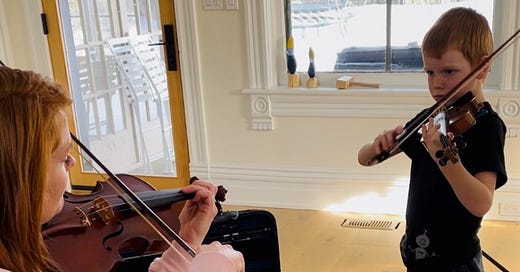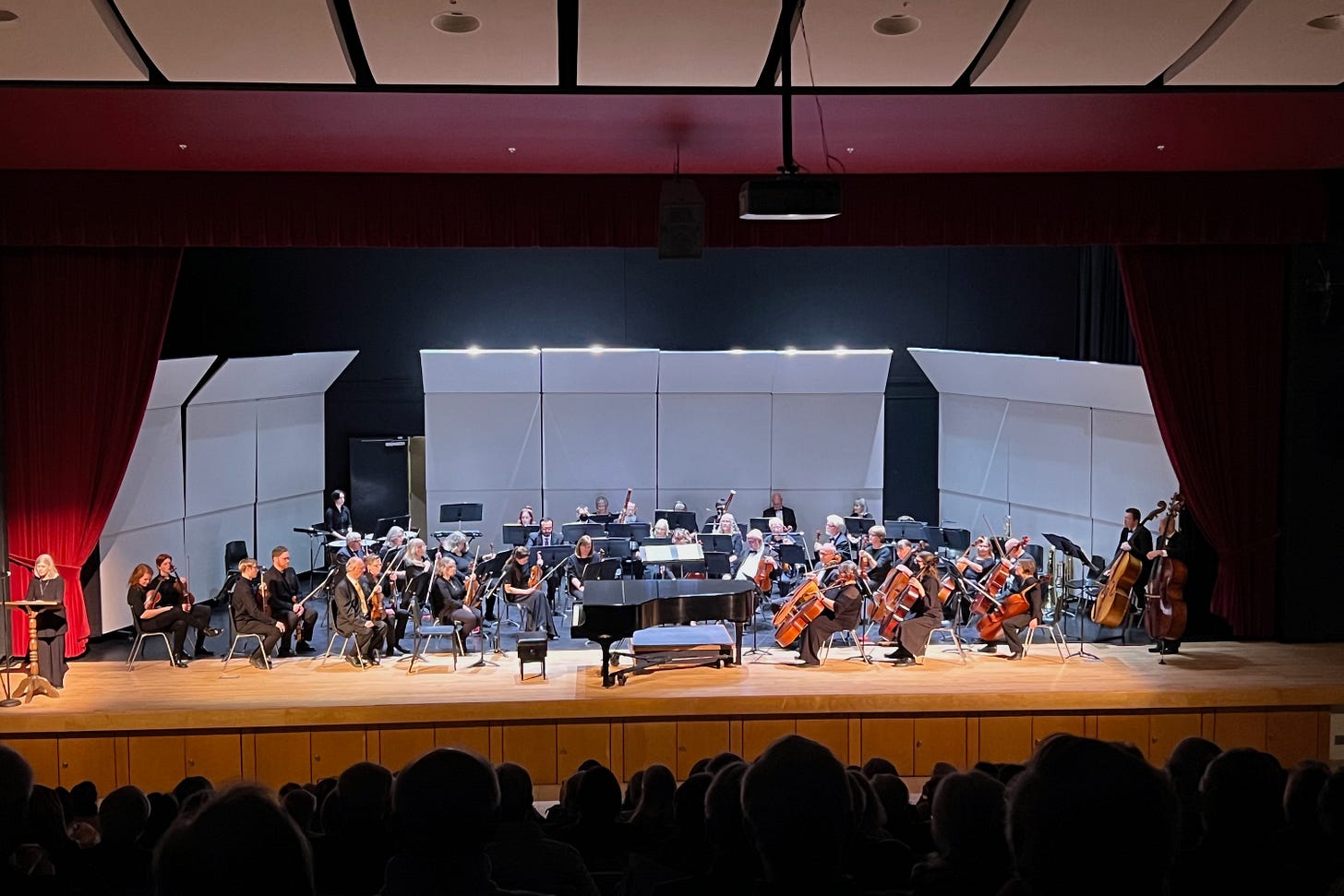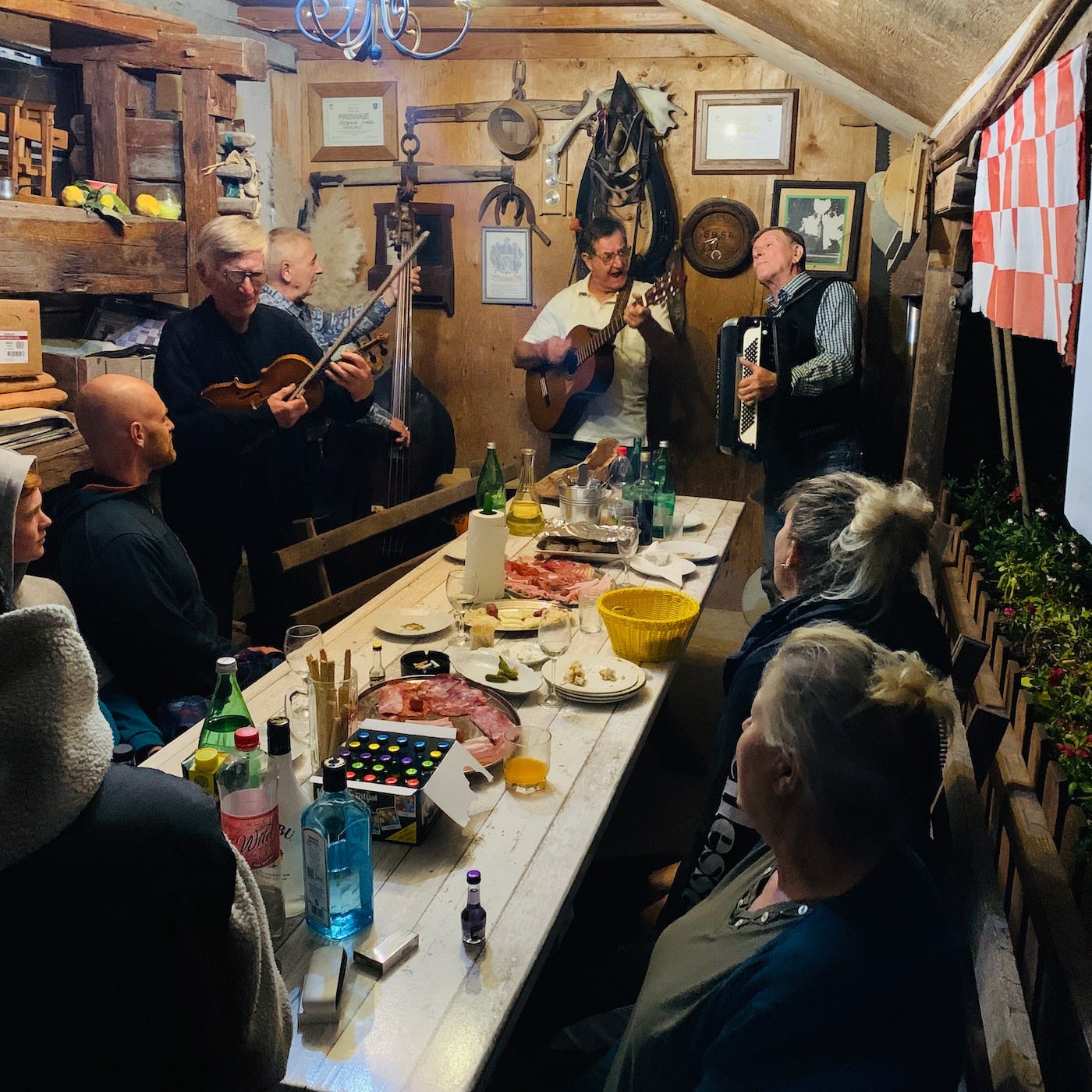If you were to stop by my house in the mornings before school, you’d step through the door and be greeted by competing strains of music. One kid would be banging away at the piano in the living room, while another would be sawing away at a violin in the dining room. As soon as one violinist finishes his practice, the other one starts. Often my husband pulls out his bass guitar to guide the younger ones along, helping to demonstrate their lines and learn fingerings, and then the whole house rumbles.
It’s a real cacophony, but I take great satisfaction in knowing that each day they’re getting a little bit better at their respective instruments—and that they’re developing a skill that has potential to give them real pleasure and versatility and maybe even earning potential down the road, should they choose to take it that far.
Now that my oldest son has reached a level where he can be my stand partner in the first violin section of a nearby symphony, more parents have approached me with questions about music lessons. They ask about the nitty-gritty details of practicing—why we are so committed, how we stick to a daily routine, and whether my kids actually like it.
I’ll address that last question first, since it’s the one that all parents agonize over, and the answer is NO! I have yet to meet a child who likes practicing—or an accomplished musical adult who says they did—but I’ve met countless adults who wish their parents had made them keep practicing.
We went through a rough stage with one child who used to cry and make gagging sounds every time he sat down at the piano and never seemed to progress. It irked me beyond reason, and eventually my husband had to take over the practicing because I was getting too angry. When I told my mother that maybe we should quit, she said something I’ve never forgotten:
“The real point of music lessons is not to get good at an instrument. It’s about discipline. You’re teaching your kid to sit down and do something hard every single day, even if he doesn’t like it. Getting good is just a bonus. But you’re not wasting time by teaching him discipline that can be applied to everything else in life.”
My two younger kids continue to resist practicing most days and the older one complains and sulks. But because it’s nonnegotiable, their complaints get them nowhere and only serve to prolong the time until they’re done, so eventually they get to work, motivated by the countdown on their timer—45 minutes for the oldest, 30 minutes for the middle kid, 20 minutes for the littlest.
That is where consistency comes in. It is crucial to have a routine set in stone and not to deviate from it; that way, the kids understand exactly what’s expected of them. Mine practice every weekday, Monday to Friday, but never on weekends or holidays. They get the summers, Christmas, and March Break off. (That’s far more lenient than many serious music families I’ve known.) Practicing in the mornings before school is most effective for us; there are no competing activities, and the kids aren’t yet tired from the day.
Why Do I Persist?
That question of discipline is key. Kids need to learn grit, resilience, and stick-to-itiveness somehow, and music lessons are an effective tool. I do think it’s getting harder to teach those qualities to kids in an increasingly urban and digital world, where less work is tangible. It’s not like we live on a farm where they can learn from daily chores.
Sports are another way to learn discipline, and my kids do participate in various sports, but I think that music is a longer-lasting life skill with more practical applications. For example, I made a lot of money playing at weddings every weekend in the summer as a teenager. When my son complained about why I prioritize music instead of hockey, a fellow violinist friend responded to him, “Let me put it to you this way: I’m approaching 80 and I’m still playing in the symphony. I doubt I’d be out on a hockey rink, no matter how good I might have been at your age.”
Playing music exposes kids to people of all ages and skill levels. It fosters cross-generational relationships with teachers and other ensemble and symphony members that provide tremendous value to kids. Sometimes I think kids don’t have enough “old” friends from whom to gain wisdom and perspective on the world.
Playing an instrument like a violin that has barely changed in 500 years (and doesn’t need a power supply!) is also a way of pushing back against an increasingly online world where children have fewer opportunities to engage in physical creative activities. Kids are deeply embodied creatures who need to use their hands and bodies to feel alive, to develop real skills, to feel a true sense of accomplishment in what they do. Insisting on practicing allows them to learn and improve and eventually take pride in what they know—and every kid has the right to feel proud of something they’ve achieved.
What’s Needed?
I mentioned consistency already, which stems far more from a determined parent than an interested child, but it helps to find a good teacher with whom the kid can form a great relationship. If they like and respect their teacher, they will want to please. While paying for lessons can be expensive, it creates accountability. I could teach my younger child, but we’d have a much harder time showing up for each other each week.
It’s important to find opportunities to have fun with music. We learn fiddle tunes and have impromptu recitals and jam sessions with friends and family. All of my kids play other instruments at school, and my oldest in particular is realizing how training in one instrument translates to proficiency in another. He’s currently obsessed with saxophone and acknowledges that years of violin makes it relatively easy for him to play and read music.
Expose them to excellence. Show them what a great musician looks and sounds like. My middle child recently saw a concert pianist in action and was mind-blown. He said he intends to practice harder. We listen to a broad range of music at home, from jazz, blues, and bossa nova, to classical, rock, and pop, all of which provides inspiration on some level.
To sum it up, I just think music makes life better. It is a language that opens doors to new worlds and enables relationships with people you might not meet otherwise. One wonderful example of this was visiting my husband’s family in Croatia last fall, where the extended family prepared an outdoor feast and the neighbours showed up to play music. They played traditional folk songs for six hours straight, while we ate and drank, everyone sang along, and the kids danced until their tired legs couldn’t hold them up anymore.
On mornings when practicing feels like the last thing I want to insist on, I remember magical moments like that night and think, “We can do this.” And minute by minute, day by day, we do—and the reward is seeing the look of delight on my son’s face when he finishes performing his first-ever full-length symphony and receives compliments from an admiring audience. That’s the look of hard work paying off in real time.
You might also like: When Adults Help Kids







I really, really love how you have done this with your family! I enjoy music so much and wish everyone would be introduced to it early on in their lives!
This!!! All of this. I started Suzuki violin at age 3, switched to cello at 7, and am now studying at conservatory. If I had my way about practicing as a kid, I wouldn't be here now, and I'm so glad my parents made me keep studying. It was my choice to continue after high school, and I will never regret the decision. Do I always like practicing? Definitely not, and no musician I have ever met does. We make kids do math even if they don't like it, so why not music?